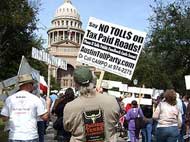Article from: www.thenewspaper.com/news/16/1640.asp
3/8/2007
Texas Legislature Revolts Against Toll Roads
A growing majority of Texas legislators, after hearing from the public, supports a halt to new toll roads.
 Legislation designed to halt the advance of toll roads in the state of Texas is likely to become law. This week, 25 of the 31 members of the state Senate added their names as co-sponsors of a measure imposing a moratorium on new toll road construction. In the House, 53 of 150 members have signed on to the effort thus far.
Legislation designed to halt the advance of toll roads in the state of Texas is likely to become law. This week, 25 of the 31 members of the state Senate added their names as co-sponsors of a measure imposing a moratorium on new toll road construction. In the House, 53 of 150 members have signed on to the effort thus far.
Specifically, the measure forbids any new agreements giving private companies the power to collect tolls on new roads or to sell existing roads to tolling companies. The moratorium would end on September 1, 2009, giving a new legislative study committee time to weigh the potential costs and benefits of toll proposals.
Support for the legislation follows a public protest in Austin on Texas Independence Day and a rancorous ten-hour Senate hearing where nearly a thousand citizens came to oppose tolls. The moratorium bill is just one of a number of bills restricting public-private partnerships. Senator Jane Nelson (R-Lewisville) also introduced legislation that would require full disclosure of toll contract details. The move is designed to protect the public against secret non-compete agreements designed to force motorists off of free roads and onto the pay roads.
Article Excerpt:
By: Nichols, et al. S.B. No. 1267
A BILL TO BE ENTITLED
AN ACT
relating to a moratorium on the inclusion of certain provisions in a comprehensive development agreement or the sale of a toll project and to the creation and duties of a study committee.
BE IT ENACTED BY THE LEGISLATURE OF THE STATE OF TEXAS:
SECTION 1. Subchapter E, Chapter 223, Transportation Code, is amended by adding Section 223.210 to read as follows:
Sec. 223.210. MORATORIUM ON CERTAIN TERMS IN COMPREHENSIVE DEVELOPMENT AGREEMENTS OR SALE OF TOLL PROJECTS. (a) In this section:
(1) "Toll project" means a toll project described by Section 201.001(b), regardless of whether the toll project:
(A) is a part of the state highway system; or
(B) is subject to the jurisdiction of the department.
(2) "Toll project entity" means a public entity authorized by law to acquire, design, construct, finance, operate, or maintain a toll project, including:
(A) the department;
(B) a regional tollway authority;
(C) a regional mobility authority; or
(D) a county.
(b) A comprehensive development agreement entered into with a private participant by a toll project entity on or after the effective date of this subsection for the acquisition, design, construction, financing, operation, or maintenance of a toll project may not contain a provision permitting the private participant to operate and collect revenue from the toll project.
(c) On or after the effective date of this subsection, a toll project entity may not sell or enter into a contract to sell a toll project of the entity to a private entity.
(d) A legislative study committee is created. The committee is composed of nine members, appointed as follows:
(1) three members appointed by the lieutenant governor;
(2) three members appointed by the speaker of the house of representatives; and
(3) three members appointed by the governor.
(e) The legislative study committee shall select a presiding officer from among its members and conduct public hearings and study the public policy implications of including in a comprehensive development agreement entered into by a toll project entity with a private participant in connection with a toll project a provision that permits the private participant to operate and collect revenue from the toll project. In addition, the committee shall examine the public policy implications of selling an existing and operating toll project to a private entity.
(f) Not later than December 1, 2008, the legislative study committee shall:
(1) prepare a written report summarizing:
(A) any hearings conducted by the committee;
(B) any legislation proposed by the committee;
(C) the committee's recommendations for safeguards and protections of the public's interest when a contract for the sale of a toll project to a private entity is entered into; and
(D) any other findings or recommendations of the committee; and
(2) deliver a copy of the report to the governor, the lieutenant governor, and the speaker of the house of representatives.
(g) On December 31, 2008, the legislative study committee created under this section is abolished.
(h) This section expires September 1, 2009.
SECTION 2. This Act takes effect immediately if it receives a vote of two-thirds of all the members elected to each house, as provided by Section 39, Article III, Texas Constitution. If this Act does not receive the vote necessary for immediate effect, this Act takes effect September 1, 2007.
 Legislation designed to halt the advance of toll roads in the state of Texas is likely to become law. This week, 25 of the 31 members of the state Senate added their names as co-sponsors of a measure imposing a moratorium on new toll road construction. In the House, 53 of 150 members have signed on to the effort thus far.
Legislation designed to halt the advance of toll roads in the state of Texas is likely to become law. This week, 25 of the 31 members of the state Senate added their names as co-sponsors of a measure imposing a moratorium on new toll road construction. In the House, 53 of 150 members have signed on to the effort thus far.